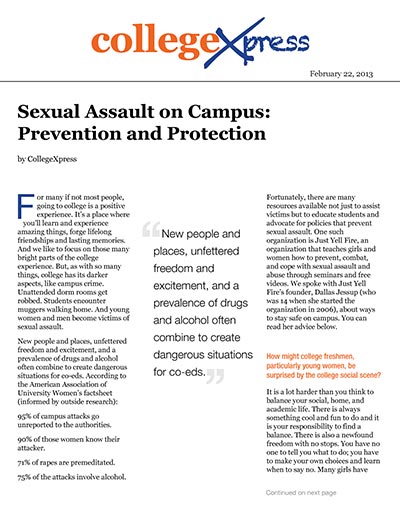For many if not most people, going to college is a positive experience. It’s a place where you’ll learn and experience amazing things, forge lifelong friendships and lasting memories. And we like to focus on those many bright parts of the college experience. But, as with so many things, college has its darker aspects, like campus crime. Unattended dorm rooms get robbed. Students encounter muggers walking home. And young women and men become victims of sexual assault.
New people and places, unfettered freedom and excitement, and a prevalence of drugs and alcohol often combine to create dangerous situations for co-eds. According to the American Association of University Women’s factsheet (informed by outside research):
- 3% of college women experience rape or attempted rape.
- 90% of those women know their attacker.
- 71% of rapes are premeditated.
- 75% of the attacks involve alcohol.
- 95% of campus attacks go unreported to the authorities.
Fortunately, there are many resources available not just to assist victims but to educate students and advocate for policies that prevent sexual assault. One such organization is Just Yell Fire, an organization that teaches girls and women how to prevent, combat, and cope with sexual assault and abuse through seminars and free videos. We spoke with Just Yell Fire’s founder, Dallas Jessup (who was 14 when she started the organization in 2006), about ways to stay safe on campus. You can read her advice below. (For more information regarding staying safe on campus, check out our other articles on Campus Health and Safety.)
How might college freshmen, particularly young women, be surprised by the college social scene?
It is a lot harder than you think to balance your social, home, and academic life. There is always something cool and fun to do and it is your responsibility to find a balance. There is also a newfound freedom with no stops. You have no one to tell you what to do; you have to make your own choices and learn when to say no. Many girls have never been exposed to total social freedom—there are a lot of temptations, and you have to remember that every action will have a consequence on your academic life and your future, good or bad.
What is the first step women should take to keep themselves safe on and off campus?
Understand the safety precautions your school has in place, whether that be text alerts, blue lights, on-campus transportation, or security escorts. Familiarize yourself with your campus and its surroundings in order to avoid sketchy areas. If a group on campus has a reputation for use of date rape drugs, poor treatment of women, or violence, take heed; there is usually a reason for the reputation. Learn basic self-defense techniques like the ones we teach in Just Yell Fire: Campus Life. Be smart, have fun, and always trust your gut.
What, if anything, do you recommend women carry with them for self-defense?
Typically we don’t recommend carrying anything for self-defense. This tends to give you a false sense of safety when, realistically, you probably won’t have the item in your hand when an attack happens. The scenes in Just Yell Fire: Campus Life came from real-life scenarios. In the “hall cruising” scene, the girl was asleep in her dorm. In the party scene, the girl’s drink was drugged at a party; in another scene the violence was perpetrated by her boyfriend, date, or while jogging. I don’t know of any girl that would have mace, pepper spray, a Taser, or a whistle on them in these conditions. It is best to learn some very easy get away techniques and use the element of surprise to disengage your attacker. That being said, if you are walking at night, having keys between your fingers ready to strike someone’s eyes is not a bad idea.
How can young women identify potentially dangerous people and situations?
The important thing to remember is an attacker can be anyone. It can be your best friend’s boyfriend, the cute guy in French class, a 40-year-old man. It is not necessarily a creep; girls have been killed by a jealous boyfriend, raped by their roommate’s brother, drugged by the bartender at a cool club, or beaten by their uncle. You have to trust your instincts, assert your rights, know that no one has the right to touch you if you don’t want them to, and leave if you feel uncomfortable.
Where can women who have been assaulted turn for help?
If you have been raped, the first thing to remember is it is not your fault. Go to the hospital and call the police, but do not take a shower or wash yourself. The DNA is vital. Your school probably has a crisis hotline, or you can call campus security.
According to a study done by the CDC, a person that has been raped is now three times more likely to be raped again. You have the power to change these statistics by becoming empowered to protect yourself and stand up for your rights.
After the assault, do find someone you feel comfortable to talk with. This is a very traumatic event; don’t think you can go it alone or just forget about it. You can do this—too many have. It takes help to overcome such a horrendous violation.

